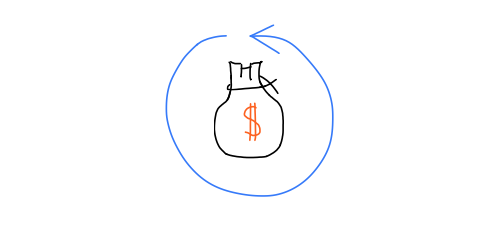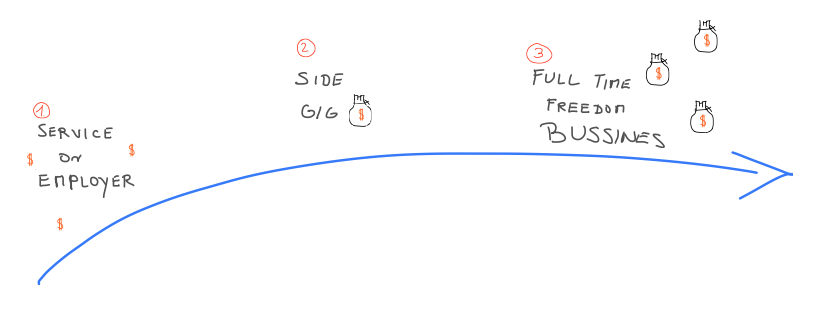♦ 🐆 3 min, 🐌 6 min
Freedom generator/business
Freedom of time, money and location.
Path
But can I just start with the freedom business full time? I'm personally not willing to take that risk. Though I could probably still afford it. I'm lucky enough that my education doesn't force me to spend all my time looking for the next job. I can thus focus on how to go a step beyond. After some digging, I noticed that most of the success stories followed something like this:
- 1.) Start working for an employer or offer a service to others. Something that pays the bills but not necessarily what we want.
- 2.) In the free time, start a side gig that earns extra cash.
- 3.) Transition to full-time self-employment by expanding the side gig.
Failed attempts
I began my journey through a startup course in February 2017. In the first try, I worked on someone else's idea to create a finance management app. Then in May, the team had decided to kick me out. Ouch. Four months of my work and inputs went up in flames. Now that I look back, I'm glad I was kicked off the team. The idea was a dead-end anyway.Before the final course pitches in June, I came up with another idea. A hub for explanations of scientific articles. I pitched the idea. Another disaster that would not work because nobody will pay for it. Anyway, I learned quite a few lessons. Most valuable one:You're not solving big enough of a problem.Try number three. From 2018 to 2019, I assembled a team of three. We actually tested our product for a few months ourselves. Then finally figured how we can test a dummy prototype with users. Believe it or not, excel sheets were more than enough. Result? OK, not gonna work, and similar products already exist. Thank god we tested the product before building the whole codebase. We didn't have an idea about where to go next, so we broke the team off. Lesson?Get the idea to the user's hands immediately. Not after one year of "development".Philosophy
Going along the journey of the startup tries, I kept reading books. If fact, a lot of them since I managed to watch fewer movies somehow. Anyway, I realized that I needed to ask my self:What are my motives for the business? What values should my business live by?I realized that I wanted to have a business that gives me freedom. Period. Since I never jump into the cold water before considering my options, I spent some time thinking about what kind of business I wanted to run. After all the books I read and the things I tried, a philosophy is starting to form.OK so:- I don't need a team.
- I don't need a startup with a fancy app that's the next Instagram.
- I don't need a VC and a ton of money. Good.
- I can just build a bunch of assets and sell them.
- Cool, but how do I sell?
- Aha online marketing.
- But I don't have an audience to sell to.
- Use adds?
- I don't want to pay for adds.
- OK, how do I get an audience?
- I write to create value for users and then convert them into paying customers.
- Wait, I need an audience and online relationships? Not a business idea.
- Uhh ?? Well, maybe it will work.
Now what?
I decided to work on the Freedom business as a team of one. Try to build assets, business relationships, and audience. My biggest blind spot to this day is still marketing, and the customer is the king. I come from STEM, after all. Coding and physics is the easy part here 😛 I want to share my learnings from the journey. I learned a ton from the journeys of others. So I want to give back to the community. Sure I'll repeat myself and say things others said before. Maybe someone will listen and find things useful. Next week I'll cover: Why Team of one?Get notified & read regularly 👇